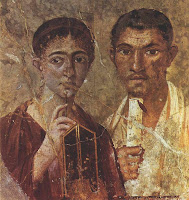An article written by a member of our group, Prof. Sánchez-Ostiz, will be soon published by Estudios Clásicos (Sociedad Española de Estudios Clásicos). Today we can offer you an abstract (in English and Spanish) of this forthcoming work:
 VICTORVM VESTIGIA: THE INFLUENCE OF LATIN LITERATURE IN THE LITERARY CULTURE OF GREECE
VICTORVM VESTIGIA: THE INFLUENCE OF LATIN LITERATURE IN THE LITERARY CULTURE OF GREECEThis paper examines the proofs for the knowledge of Latin language and literature in the Greek world. Without specifically dealing with more general aspects like the bilingualism or the matter of Rome in Greek Literature, a special attention is dedicated to five more concrete evidences: a) Greek translations of Latin literary texts; b) the teaching of Latin language in the Greek world; c) Latin literary papyri from Egypt; d) literary authors of Greek origin who wrote in Latin; e) possible Latin hypotexts in Greek texts. These testimonies demonstrate that the presence of Rome in the culture of Greece is greater than what the traditional opinion defends and that it characterizes also the Late Antiquity as an intercultural interaction of traditions
VICTORVM VESTIGIA: EL INFLUJO DE LAS LETRAS LATINAS EN LA CULTURA LITERARIA DE GRECIA
 Este trabajo rastrea los indicios de la presencia de la lengua y literatura latinas en el mundo griego. Sin tratar específicamente aspectos más generales como el bilingüismo y el hecho de que Roma haya sido tema de la literatura griega, se dedica especial atención a cinco fenómenos más concretos: a) las traducciones griegas de textos literarios latinos; b) la enseñanza de la lengua latina en el mundo heleno; c) los papiros literarios latinos hallados en Egipto; d) los autores literarios de origen griego que escriben en latín; e) los posibles hipotextos latinos en obras griegas. Estos testimonios evidencian que la huella de Roma en la cultura de Grecia es mayor de lo que defiende la opinión tradicional y asimismo caracterizan la cultura literaria de la Antigüedad tardía como una síntesis intercultural de tradiciones
Este trabajo rastrea los indicios de la presencia de la lengua y literatura latinas en el mundo griego. Sin tratar específicamente aspectos más generales como el bilingüismo y el hecho de que Roma haya sido tema de la literatura griega, se dedica especial atención a cinco fenómenos más concretos: a) las traducciones griegas de textos literarios latinos; b) la enseñanza de la lengua latina en el mundo heleno; c) los papiros literarios latinos hallados en Egipto; d) los autores literarios de origen griego que escriben en latín; e) los posibles hipotextos latinos en obras griegas. Estos testimonios evidencian que la huella de Roma en la cultura de Grecia es mayor de lo que defiende la opinión tradicional y asimismo caracterizan la cultura literaria de la Antigüedad tardía como una síntesis intercultural de tradiciones

